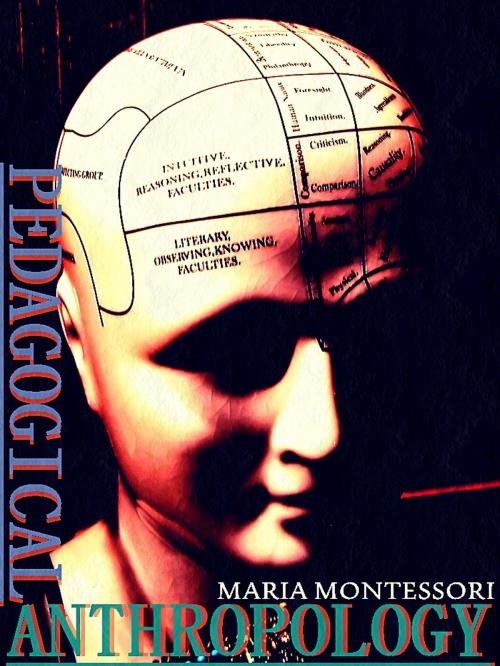Pedagogical Anthropology
(Illustrations)
Nonfiction, Science & Nature, Science, Biological Sciences, Physiology, Reference & Language, Reference, Biography & Memoir| Author: | Maria Montessori | ISBN: | 1230000265939 |
| Publisher: | FREDERICK A. STOKES COMPANY | Publication: | September 4, 2014 |
| Imprint: | Language: | English |
| Author: | Maria Montessori |
| ISBN: | 1230000265939 |
| Publisher: | FREDERICK A. STOKES COMPANY |
| Publication: | September 4, 2014 |
| Imprint: | |
| Language: | English |
Example in this ebook
For some time past much has been said in Italy regarding Pedagogical Anthropology; but I do not think that until now any attempt has been made to define a science corresponding to such a title; that is to say, a method that systematises the positive study of the pupil for pedagogic purposes and with a view to establishing philosophic principles of education.
As soon as anthropology annexes the adjective, "pedagogical," it should base its scope upon the fundamental conception of a possible amelioration of man, founded upon the positive knowledge of the laws of human life. In contrast to general anthropology which, starting from a basis of positive data founded on observation, mounts toward philosophic problems regarding the origin of man, pedagogic anthropology, starting from an analogous basis of observation and research, must rise to philosophic conceptions regarding the future destiny of man from the biological point of view. The study of congenital anomalies and of their biological and social origin, must undoubtedly form a part of pedagogical anthropology, in order to afford a positive basis for a universal human hygiene, whose sole field of action must be the school; but an even greater importance is assumed by the study of defects of growth in the normal man; because the battle against these evidently constitutes the practical avenue for a wide regeneration of mankind.
If in the future a scientific pedagogy is destined to rise, it will devote itself to the education of men already rendered physically better through the agency of the allied positive sciences, among which pedagogic anthropology holds first place.
The present-day importance assumed by all the sciences calculated to regenerate education and its environment, the school, has profound social roots and is forced upon us as the necessary path toward further progress; in fact the transformation of the outer environment through the mighty development of experimental sciences during the past century, must result in a correspondingly transformed man; or else civilisation must come to a halt before the obstacle offered by a human race lacking in organic strength and character.
The present volume comprises the lectures given by me in the University of Rome, during a period of four years, all of which were diligently preserved by one of my students, Signor Franceschetti. My thanks are due to my master, Professor Giuseppe Sergi who, after having urged me to turn my anthropological studies in the direction of the school, recommended me as a specialist in the subject; and my free university course for students in the Faculty of Natural Sciences and Medicine was established, in pursuance of his advice, by the Pedagogic School of the University of Rome. The volume also contains the pictures used in the form of lantern slides to illustrate the lectures, pictures taken in part from various works of research mentioned in this volume. Acknowledgment is gratefully made to the scientists and scholars whose work is thus referred to.
To be continue in this ebook................................................................................................................
Example in this ebook
For some time past much has been said in Italy regarding Pedagogical Anthropology; but I do not think that until now any attempt has been made to define a science corresponding to such a title; that is to say, a method that systematises the positive study of the pupil for pedagogic purposes and with a view to establishing philosophic principles of education.
As soon as anthropology annexes the adjective, "pedagogical," it should base its scope upon the fundamental conception of a possible amelioration of man, founded upon the positive knowledge of the laws of human life. In contrast to general anthropology which, starting from a basis of positive data founded on observation, mounts toward philosophic problems regarding the origin of man, pedagogic anthropology, starting from an analogous basis of observation and research, must rise to philosophic conceptions regarding the future destiny of man from the biological point of view. The study of congenital anomalies and of their biological and social origin, must undoubtedly form a part of pedagogical anthropology, in order to afford a positive basis for a universal human hygiene, whose sole field of action must be the school; but an even greater importance is assumed by the study of defects of growth in the normal man; because the battle against these evidently constitutes the practical avenue for a wide regeneration of mankind.
If in the future a scientific pedagogy is destined to rise, it will devote itself to the education of men already rendered physically better through the agency of the allied positive sciences, among which pedagogic anthropology holds first place.
The present-day importance assumed by all the sciences calculated to regenerate education and its environment, the school, has profound social roots and is forced upon us as the necessary path toward further progress; in fact the transformation of the outer environment through the mighty development of experimental sciences during the past century, must result in a correspondingly transformed man; or else civilisation must come to a halt before the obstacle offered by a human race lacking in organic strength and character.
The present volume comprises the lectures given by me in the University of Rome, during a period of four years, all of which were diligently preserved by one of my students, Signor Franceschetti. My thanks are due to my master, Professor Giuseppe Sergi who, after having urged me to turn my anthropological studies in the direction of the school, recommended me as a specialist in the subject; and my free university course for students in the Faculty of Natural Sciences and Medicine was established, in pursuance of his advice, by the Pedagogic School of the University of Rome. The volume also contains the pictures used in the form of lantern slides to illustrate the lectures, pictures taken in part from various works of research mentioned in this volume. Acknowledgment is gratefully made to the scientists and scholars whose work is thus referred to.
To be continue in this ebook................................................................................................................















